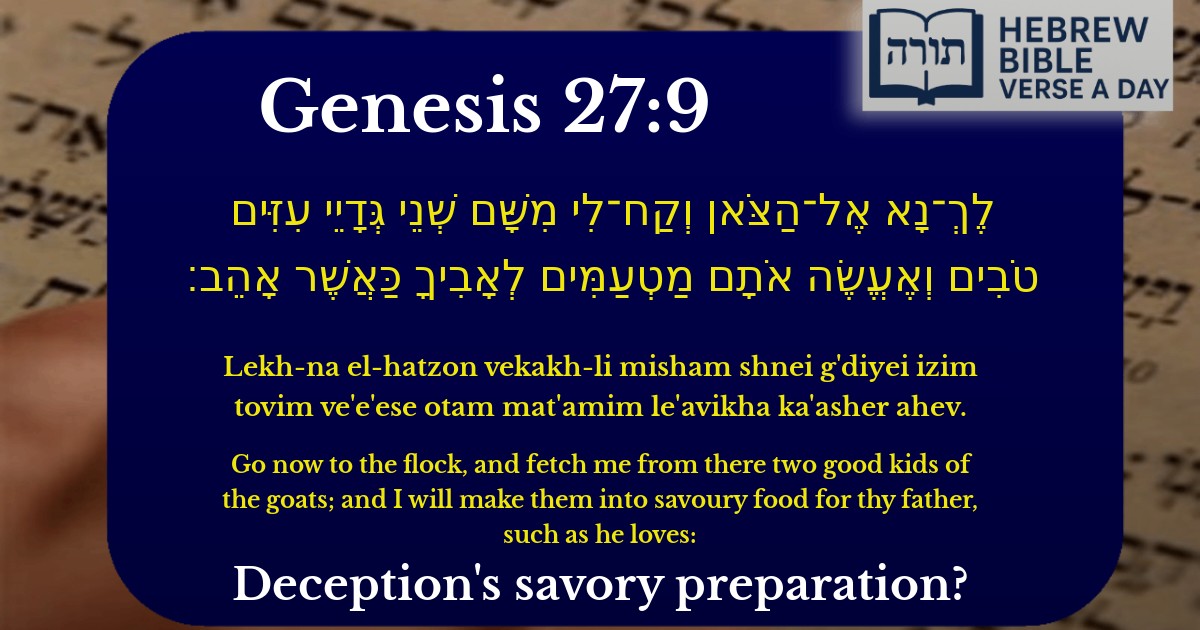Join Our Newsletter To Be Informed When New Videos Are Posted
Join the thousands of fellow Studends who rely on our videos to learn how to read the bible in Hebrew for free!
Hebrew Text
לֶךְ־נָא אֶל־הַצֹּאן וְקַח־לִי מִשָּׁם שְׁנֵי גְּדָיֵי עִזִּים טֹבִים וְאֶעֱשֶׂה אֹתָם מַטְעַמִּים לְאָבִיךָ כַּאֲשֶׁר אָהֵב׃
English Translation
Go now to the flock, and fetch me from there two good kids of the goats; and I will make them into savoury food for thy father, such as he loves:
Transliteration
Lekh-na el-hatzon vekakh-li misham shnei g'diyei izim tovim ve'e'ese otam mat'amim le'avikha ka'asher ahev.
Hebrew Leining Text
לֶךְ־נָא֙ אֶל־הַצֹּ֔אן וְקַֽח־לִ֣י מִשָּׁ֗ם שְׁנֵ֛י גְּדָיֵ֥י עִזִּ֖ים טֹבִ֑ים וְאֶֽעֱשֶׂ֨ה אֹתָ֧ם מַטְעַמִּ֛ים לְאָבִ֖יךָ כַּאֲשֶׁ֥ר אָהֵֽב׃
לֶךְ־נָא֙ אֶל־הַצֹּ֔אן וְקַֽח־לִ֣י מִשָּׁ֗ם שְׁנֵ֛י גְּדָיֵ֥י עִזִּ֖ים טֹבִ֑ים וְאֶֽעֱשֶׂ֨ה אֹתָ֧ם מַטְעַמִּ֛ים לְאָבִ֖יךָ כַּאֲשֶׁ֥ר אָהֵֽב׃
🎵 Listen to leining
Parasha Commentary
📚 Talmud Citations
This verse is quoted in the Talmud.
📖 Chullin 95b
The verse is referenced in a discussion about the permissibility of certain types of animals for consumption and the preparation of food.


Context of the Verse
This verse (Genesis 27:9) is part of the narrative where Rivka (Rebecca) instructs her son Yaakov (Jacob) to prepare a meal for his father Yitzchak (Isaac) in order to receive the blessings intended for Eisav (Esau). The verse reflects Rivka's strategic planning to ensure that Yaakov, the more spiritually worthy son, receives the blessings.
Analysis of the Hebrew Text
The phrase "לֶךְ־נָא אֶל־הַצֹּאן" ("Go now to the flock") is understood by Rashi as Rivka urging Yaakov to act swiftly. The term "נָא" (often translated as "please" or "now") here conveys urgency, as Rivka recognized the critical timing of securing the blessings before Eisav could return.
Significance of "Two Good Kids of the Goats"
Rashi explains that Rivka asked for "שְׁנֵי גְּדָיֵי עִזִּים טֹבִים" ("two good kids of the goats") because Yitzchak's palate had become refined due to the Akeidah (Binding of Isaac). The meat of young goats was considered tender and flavorful, fitting for a meal meant to delight Yitzchak. Additionally, the Midrash (Bereshit Rabbah 65:16) suggests that the two goats allude to future events: one representing the Passover offering and the other the Yom Kippur scapegoat, symbolizing Yaakov's descendants' future service in the Mishkan (Tabernacle).
The Preparation of the Meal
The phrase "וְאֶעֱשֶׂה אֹתָם מַטְעַמִּים" ("and I will make them into savory food") highlights Rivka's role in ensuring the success of Yaakov's mission. The Sforno notes that Rivka's culinary skills were essential to replicate the taste Eisav typically prepared, ensuring Yitzchak would not suspect the substitution. This underscores the principle of hishtadlut (human effort) in fulfilling divine will, as Rivka acted to actualize Hashem's prophecy that "the elder shall serve the younger" (Genesis 25:23).
Yitzchak's Preferences
The concluding phrase "כַּאֲשֶׁר אָהֵב" ("such as he loves") is interpreted by Ramban as emphasizing Rivka's intimate knowledge of Yitzchak's tastes. This detail reinforces the idea that every aspect of the plan was meticulously designed to avoid suspicion. The Kli Yakar adds that Yitzchak's love for this dish may have been tied to its association with Eisav's hunting, making it even more crucial for Yaakov to present the meal convincingly.